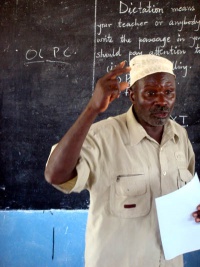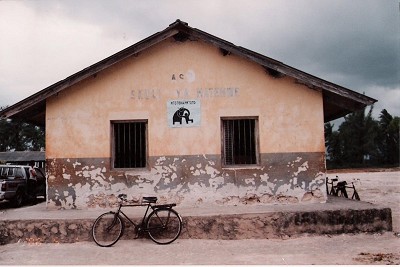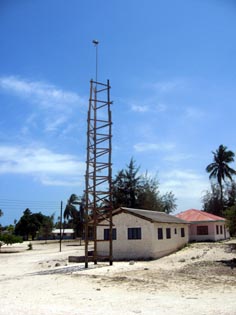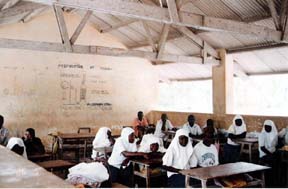OLPCorps Jamii OLPC Tanzania
Jamii OLPC
“Jamii” means "community" in Swahili, and is the foundational principle of Jamii OLPC's OLPCorps Africa proposal:
Real, sustainable development comes from the people who make cities, towns and villages communities.
A partnership between Matemwe School, and the Matemwe School Computer Centre NGO (Certificate #701) of Zanzibar, Tanzania and numerous international team members, Jamii OLPC is a small but experienced multi-national, multi-university team applying to the One Laptop per Child 2009 OLPCorps Africa program.
Jamii OLPC hopes to be accepted into the OLPCorps Africa program and provided with 100 XO laptops to begin an XO Library at Matemwe.
Children are the future; if equipped with education, tools and opportunities, this generation can take up the battle to improve the lives of their families, community and country--and win.
This generation can make a difference.
Visit our website
You can also email us at JamiiOLPC@gmail.com.
News!
| 04/21/09 Unfortunate News Two days ago, after a lengthy and anxious waiting period, Jamii OLPC received word that we have not been accepted into OLPCorps 2009. Of 200+ applications, 15 teams have been chosen (full notification email posted below); however, at this point OLPC has yet to make an official announcement about the successful applications, which has caused some tension within the OLPC community. |
OLPCorps 750 Word Proposal
This is the unformatted version; please download the formatted version, with hyperlinks, here.
Jamii OLPC is an experienced multi-national, multi-university team partnered with Matemwe School and the Matemwe School Computer Centre (MSCC) NGO, in Zanzibar, Tanzania. The proposal creation process has been an intensely collaborative effort between the four units that make up Jamii OLPC:
- the International Unit
- the Matemwe Unit
- the Pedagogical Advisory Unit
- the Information Communication Technologies for International Development (ICT4D) Advisory Unit
The three International Unit members participating in the deployment fieldwork—Samantha Burton, Daniel Drake and Deanne van Tol—were selected for their strong position-specific backgrounds, international experience and adaptability.
Matemwe School is a government school located in the rural fishing village of Matemwe, Zanzibar.
The school houses 921 primary and highschool students, with 515 between 7 and 12 years. Since January 2006, Matemwe School officials, teachers and community leaders have aimed to “bridge the digital divide” through Project Panga Magae. They have made significant progress, including the development of the Matemwe School Computer Centre, an official Zanzibar NGO. All teachers have participated in computer training programs and MSCC has electricity, internet access and 10 computers; however, only 15 highschool students are able to take computer classes and, because of high utility costs, the computers must primarily be used as an Internet Cafe for tourists.
OLPCorps would allow Project Panga Magae take the next step forward, and help MSCC expand from a rural community’s dream into a sustainable bridge across the digital divide.
Jamii OLPC has put careful thought and considerable time into determining the most inclusive manner of integrating 100 XOs into a school of 500+ primary students. After extensive work-shopping of possibilities, MSCC concluded that the best option for optimizing student saturation, embodying the OLPC Core Principles, and promoting inclusivity is to begin an XO Library (detailed here). OLPC’s Paul Commons confirmed that the XO Library would be an acceptable creative deployment strategy, due to the unique properties and limitations of the OLPCorps small deployments.
The XO Library attempts to maximize the concept of child ownership by ensuring that the laptops are signed out of the school every day, in addition to being used in the classroom. We are seeking OLPC's input on this proposal, as we understand that it will generate some uncertainty by taking a different approach the core principle of saturation. Another possibility is a 1:1 model where we saturate a small number of classrooms and actively seek ways of expanding the deployment in future. Jamii OLPC has also discussed strategies for this option, and can offer more detailed descriptions upon request.
In all deployment strategies, children in Standards 1-6 (7-12 yrs) will own the XOs, and students who have taken Matemwe’s computer class will be peer mentors. Emphasis will be placed on facilitating independent, collaborative learning and youth-driven social projects. Zanzibar’s school year runs through the summer, until Ramadan begins on August 22, 2009; the deployment will be scheduled accordingly.
Prior to deployment, the Pedagogical Advisory Unit and Matemwe Pedagogical Leads will develop an Educator’s Package, to be used and adapted during/after the deployment. Initial emphasis will be on developing
1) flexible in-class activities to complement core subjects least impacted by language/cultural challenges (ie. math and science) 2) extracurricular introductory projects (ie. the Ninakaa Hapa project)
Swahili is the main language used, although all teachers and MSCC board members speak English. Students start English lessons in Standard 2 (8 yrs). Project Coordinator Sam Burton speaks conversational Swahili.
Jamii OLPC is requesting $10,000 from OLPCorps to cover 65% of our estimated $15,486 in expenses (detailed budget here). We will raise funds to cover the remaining costs.
We will rent a truck to transport the XO shipment from Zanzibar airport to Matemwe, and store the XOs in MSCC, which will expand its existing internet access and supply charging stations for the XOs. The most significant sustainability challenge will be the increase in electricity costs.
After initial expenses, Jamii OLPC will focus on providing MSCC with solar and wind power as a self sufficient, environmentally friendly solution (see quote from Kenitel Solar). A substantial part of this endeavor will involve securing stable post-deployment financial support, including partnerships with hotels in the Matemwe area (see detailed fundraising strategies here).
Matemwe School has worked hard to realize the dream of equipping its children with the education, tools and opportunities to improve the lives of their families, community and country. Jamii OLPC can help this rural community’s dream flourish and grow further—to move from a progressive and innovative idea, to a tangible opportunity for change.
Supporting Documents
Preliminary Budget
Solar & Wind Power preliminary quote from Kenitel Solar
note: figures in Kenyan shillings
Letters of Support
Letter from MSCC
Letter from Matemwe School Headmaster
Letter from the Zanzibar Ministry of Education
Letter from Shea of Matemwe Village
Matemwe School
Matemwe is a rural fishing village, located on the north-east coast of Zanzibar, Tanzania.
At Matemwe School, facilities are minimal and there is forever a shortage of school supplies, but the desire for education burns in the hearts of all.
Visit Matemwe School’s official website here.
Project Panga Magae
In January 2006, Matemwe School began a journey toward a dream.
This dream grew from a seedling planted in October 2004, when a privately donated Compaq computer was installed in the Matemwe School library. As teachers received computer training over the course of a year, the Matemwe community began to rally around the idea of teaching their children to become computer literate. Valuable technical skills would open many doors for the next generation; something had to be done.
So, in January 2006, Project Panga Magae was officially started.
Yet, despite all of the efforts of the school and community, 10 computers in a school of over 900 students is no more than a raindrop in the ocean.
Only 15 students are currently able to participate in a computer class. Also, due to the high utility costs (ie. electricity and internet connection) the computers must primarily be used to run an Internet Cafe for tourists.
This provides just enough income to support the computers’ upkeep, but limits the access that Matemwe students and community members have to the lab.
Matemwe School Computer Centre (MSCC) NGO
In March 2009, Project Panga Magae successfully registered the Matemwe School Computer Centre (MSCC) as an official NGO in Zanzibar. Under Zanzibar's Registrar of Societies, the MSCC is Certificate #701.
The MSCC Board of Directors consists of the Project Panga Magae Committee Members, as well as several other teachers and staff at Matemwe School.
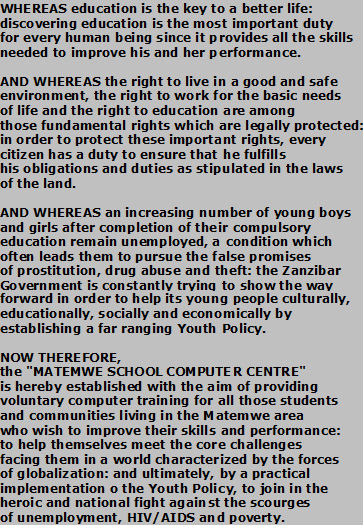
An XO Library for MSCC
The idea of an XO Library was introduced to the Jamii OLPC team by the MSCC, and subsequently approved by Paul Commons of OLPCorps as an acceptable deployment strategy.
The XO Library is the most feasible option for optimizing student saturation with limited hardware, as it will provide all 500+ primary school students with access to the 100 XOs. The XO Library will primarily serve the youngest generation at Matemwe School.
Standards 1-6 (7-12 yrs) at Matemwe School will rotate in-class computer use throughout the week, and the XO laptops will be available for these children to sign-out and take home each day, providing equal opportunity for each child to take a laptop home at least once a week.
The children will retain all ownership responsibilities for the XOs, and be in charge of the protection and maintenance of the laptops. The Matemwe School Computer Centre will organize the daily operations of the XO Library, as well as provide internet access and charging stations for the laptops.
On weekends, the MSCC will offer peer-facilitated computer-based training programs and educational activities for children, teachers and community members. Emphasis will be placed on facilitating the development of youth-driven social projects, helping children become agents of change in their community.
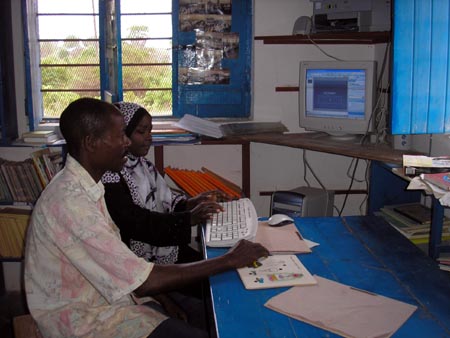
Matemwe teachers receiving computer training
Jamii OLPC Team
The Jamii OLPC team is made up of four units:
- the International Unit
- the Local Unit
- the Pedagogical Advisory Unit
- the Information Communication Technologies for International Development (ICT4D) Advisory Unit
Cooperation and collaboration between the four units is of paramount importance to the success and sustainability of the project. Because of this, the members of all units will be featured here.
International Unit
These individuals are the core Jamii OLPC team, organizing all major aspects of preparation and deployment. They are also responsible for direct communication with OLPCorps.
Only Sam Burton, Daniel Drake and Deanne val Tol will be participating in the fieldwork aspect of the deployment.
Click on the position title for a full description, and on a team member's name for a full bio.
| Position (F=fieldwork) | Name | Country | University | Major | |
|---|---|---|---|---|---|
| Project Coordinator & Political Lead (F) | Samantha Burton | Canada | Carleton University | MA Mass Communications (current) | Samantha.V.Burton@gmail.com
|
| Technical Lead (F) | Daniel Drake | United Kingdom | University of Manchester | BA Computer Science (graduate) | dsd@laptop.org
|
| Pedagogical Lead (F) | Deanne val Tol | Canada | Queens University | PhD African History (starting fall 2009) | deannevantol@gmail.com |
| Logistical & Financial Lead | Laura Tribe | Canada | Carleton University | MA Mass Communications | Tribe.laura@gmail.com |
Matemwe Unit
These individuals are the backbone of this projects success and sustainability. They are providing invaluable ongoing insight throughout the planning process, and will be key leaders during and following the deployment.
| Jamii OLPC Position | Name | Country | Matemwe School connection |
|---|---|---|---|
| TBD | Hamad Khamis Haji | Tanzania | Matemwe Head Teacher |
| TBD | Mkali Pili Haji | Tanzania | Matemwe Teacher; MSCC Treasurer |
| TBD | Mwalimu Machano | Tanzania | Matemwe Computer Teacher |
| International Communications | Frederica Boswell | Kenya | Matemwe School Secretary; BBC Africa |
| MSCC Student Representative | Pili Sheha Hamza | Tanzania | Matemwe School, Form 1 |
| MSCC Student Representative | Ali Mohammed Peku | Tanzania | Matemwe School, Form 1 |
| Matemwe School Computer Centre Adviser | Tim Boswell | Kenya | MSCC Chairman |
Pedagogical Advisory Unit
These individuals have extensive experience in all educational aspects of OLPC and the XO laptop, such as early childhood education, building applications in Sugar, pedagogy of technology.
Prior to the deployment, this unit will work with the International and Matemwe Pedagogical Leads to develop an Educator’s Package of flexible curricula and introductory projects.
Emphasis will be placed on developing activities complementing the core subjects least impacted by language or cultural challenges (such as math and science), as well as technological introductory activities (such as internet usage and the Ninakaa Hapa project).
During and after the deployment, the materials in this Educator’s Package will be adapted and utilized by the Matemwe Pedagogical Leads, other Matemwe School teachers, members of the MSCC and--most importantly--students themselves in the ongoing development of XO and technology-based educational strategies.
Peek in on the Educator's Package development process at the Jamii OLPC Curriculum Talk wiki page.
| Name | Country | Occupation |
|
|---|---|---|---|
| TEAM LEAD: Deanne val Tol | Canada | PhD African History (starting fall 2009), Queens University | Jamii OLPC Pedagogical Lead |
| Danny Bakan, B.A., M.A. | Canada | Instructor, Ryerson University, School of Early Childhood Education | adviser on early childhood education curriculum development; SongChild Project Leader |
| Dave Fingrut, B.A.(Hons) | Canada | MS Elementary Education, Medaille College, Buffalo, NY | adviser on grade 1-6 pedagogical requirements for Ontario and New York State; XO use in elementary education and educational game design with Scratch |
| Gracia Jalea | Canada | MA Media Studies, Concordia University | adviser on alternative & creative curriculum development (ie involving photography, video and the written word to encourage youth to share their experiences) |
| Dr. Jason Nolan | Canada | Assistant Professor, Ryerson University, School of Early Childhood Education | adviser on curriculum and pedagogy of technology; SongChild Project Leader; research: social technologies for young children, identity construction online, technology and play |
| Dr. Brett Stevens | Canada | Associate Professor, School of Mathematics & Statistics, Carleton University | adviser on XO hardware and software; constructing Sugar applications |
| Jackie Strecker | Canada | MA Communications and Cultures, York University & Ryerson University | adviser on ICTs in international development; peer-to-peer education; Tanzanian culture and Kswahili |
ICT4D Advisory Unit
These individuals and groups have a wide range of expertise and experience related to the OLPCorps project. They have generously offered their time to advise Jamii OLPC on a variety of aspects involved with our proposal.
| Name | Country | Occupation | |
|---|---|---|---|
| Dr. Josh Greenberg | Canada | Assistant Professor, Carleton University, Communication Studies; Director of the Centre for Voluntary Sector Research and Development. | Sam's MA thesis supervisor and NGO liaison advisor; research: media and communication activities in broader strategic planning on the part of NGOs, non-profits and social movement/activist organizations |
| Dr. Daniel Paré | Canada | Associate Professor, Ottawa University, Department of Communication | research: ICTs for international development, internet governance and regulation, Political economy of ICTs, science & technology policy |
| Dr. Sandra Smeltzer | Canada | Assistant Professor, University of Western Ontario, Faculty of Information & Media Studies | Centre for Independent Journalism, Malaysia; Western Heads East Advisor, Mwanza, Tanzania; research: ICTs for international development, global political economy of ICTs |
Budget & Fundraising
Jamii OLPC is requesting the full $10,000 stipend from OLPCorps, to cover 65% of our estimated $15,486 in expenses. A detailed preliminary budget is available here. The MSCC and International Unit will raise funds and pursue sources of sustainable funding to cover the remaining costs.
The most significant challenge to sustainability will be the increase in electricity costs. MSCC has decided that “a self sufficient, no monthly expense system would be the best way to sustain our project”; therefore, after initial expenses, Jamii OLPC will focus on providing MSCC with solar and wind power as a self sufficient, environmentally friendly solution (see quote from Kenitel Solar).
A substantial part of this endeavor will involve securing stable post-deployment financial support, as outlined below.
Matemwe Unit
Although Matemwe is a rural area afflicted by considerable poverty, it is also a tourist destination and home to several hotels sustained primarily by European business, a disparity that is present in numerous developing regions throughout the world.
However, this also presents a unique opportunity: Matemwe School and the MSCC will focus on developing partnerships with these local hotels, encouraging their involvement in the Matemwe community by committing to assisting with long-term funding for the environmentally friendly power options for the XO Library.
International Unit
- We are currently in the process of discussing the possibility of a partnership between Matemwe School and an Ottawa-area school. This potential partnership would provide financial sustainability for Matemwe School, connect and encourage peer-to-peer learning between children from very different cultures and countries through an e-penpal program, and provide opportunities for Ottawa-area teachers to spend their summers gaining invaluable experience volunteering with Matemwe School.
- Preliminary planning is taking place for the Jamii Galas, two elegant evenings (one in Ottawa and one in Toronto) that will serve as both promotional and fundraising events. Although still at the very beginning stages, so far we anticipate that these evenings will include a silent auction and presentations from Jamii OLPC team members.
- We are currently in the process of creating an official Jamii OLPC Sponsorship Package. If Jamii OLPC is approved, this package will be distributed to local businesses and in most cases be specifically geared toward generating support for the Jamii Galas (ie. monetary donations, silent auction items, catering for the Galas, attendance, etc).
Upon confirmation of OLPCorps acceptance, we will also seek funding and support from organizations 1) affiliated with the six universities associated with Jamii OLPC and 2) involved with XO-related technology. These include, but are not limited to:
- Carleton Graduate Student Travel/Research Bursary
- The Association of Universities and Colleges of Canada
- Aga Khan Foundation Canada
- Canadian International Development Agency
- Ottawa Canada Linux Users Group
- Toronto Linux Users Group
Project Idea Highlights
Educator's Package in Progress
View our Pedagogical Advisory Unit's discussions about curriculum and project development on the Jamii OLPC Curriculum Talk Page.
Formalized ideas will be posted below as they are finalized by the team!
SongChildTwo of the members of our Pedagogical Advisory Unit, Jason Nolan and Danny Bakan, are the Project Leaders of SongChild. The concept of SongChild is "to develop and maintain an on-line community of users, who will work together to write and share kids songs. The mandate of the site is to foster an Open License Music Project, in which users will work together to build upon and create public domain material. This musical repertoire of public domain kid's songs will be available to share and with children everywhere." As curriculum and projects are developed, the Pedagogical Advisory Unit will create a way in which to incorporate the SongChild project into Jamii OLPC. |
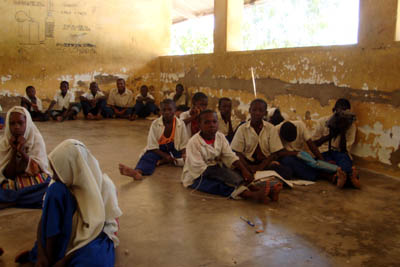 |
